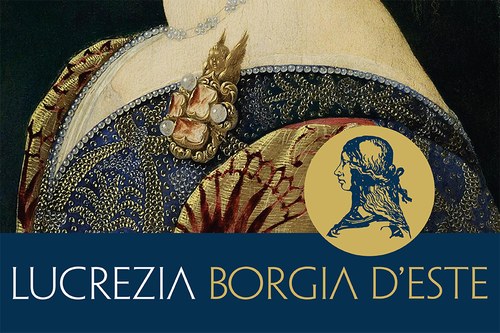- Home
- THE CENTER Apri sottomenù
- RESEARCH Apri sottomenù
- PUBLICATIONS Apri sottomenù
-
EVENTS
Apri sottomenù
- Lucretia Estensis de Borgia. Tra biografia e narrazione nelle carte dell'Archivio di Stato di Modena
- Libri e lettori nella Bologna dei papi (1506-1796)
- Pagine benedettine
- Dante e la Divina Commedia in Emilia-Romagna
- Con ogni diligenza corretto e stampato. Stampatori, librai e cartari a Faenza dal XV al XVIII secolo
- The Seasons of Scholarship and the Generations of Scholars. A European History (15th-19th Centuries)
- BIBLIOGRAPHIC RESOURCES Apri sottomenù
- AGENDA
- Contacts
- Photogallery
Lucretia Estensis de Borgia. Tra biografia e narrazione nelle carte dell'Archivio di Stato di Modena
Documentary exhibition by the Modena State Archive and the A.R.C.E. (Archivio Ricerche Carteggi Estensi).
Modena State Archive
October 3rd, 2020 - June 26th, 2021
Texts by Nicola Bonazzi, Bruno Capaci, Loredana Chines, Patrizia Cremonini, Paolo Cova, Diane Ghirardo, Francesca Florimbii, Lorenza Iannacci, Margherita Lanzetta, Rosamaria Isabella Laruccia, Leonardo Marchionni, Maria Lucia Menegatti, Maddalena Modesti, Miles Nerini, Alberto Palladini, Riccardo Pallotti, Maria Veronica Palma, Annalisa Sabattini, Francesca Speranza, Paolo Tinti, Paola Vecchi, Giacomo Ventura, Gabriella Zarri
Organised with Art Bonus Fondazione di Modena
The exhibition is part of the events for the celebrations of the 500th anniversary of the death of Lucrezia Borgia

Never before has the figure of Lucrezia presented itself as full of narrative and semantic implications and potentialities, such as the face declined to infinity, in a dizzying divertissement of style exercises, similar to the multiplier games of the lines that the postmodern has dedicated to the most famous Renaissance women portraits, just think of Leonardo's Mona Lisa. Between literary myth and history, between fiction and reality, between lights and shadows, the de Borgia with her face at moments as a machiavellica femme fatale and unscrupulous and skilled politician, at others as a caring mother and a shrewd wife, then as a patron and a fine literate (let's think to the liaison dangereuse with Bembo, from which a magnificent exchange of letters arose), and again as a devout and pious woman, seduced the souls and pens of contemporaries and posterity who wrote about her, whether or not they approached archival documents (such as Gregorovius or Bellonci), to create a female portrait that cannot be reduced to a single dimension.
For Lucrezia we can speak of a continuous metamorphosis, of a perennial transcoding of a myth: from the historiographical line of moral condemnation (incestuous Lucrezia, intriguing poisoner, ruthless and worthy daughter and sister of Alexander VI and of Caesar) inaugurated by Guicciardinian history and destined to uninterrupted fortune in the following centuries, to the theatrical dramas (the tragedy of Victor Hugo which inspired the opera set to music by Donizetti in the same year), to the very large voices of the Italian and foreign novel (from the Lucrezia Borgia by Maria Bellonci of 1939 to La figlia del papa by Dario Fo in 2014). The myth of Lucrezia has fueled the film narrative (more than twenty films from 1910 to 2006 and various television series) to even enter comics, video games, and song lyrics of musical groups of our time. She has nurtured the fantasies and passions of writers and readers, up to the fetishistic obsession with the duchess's lock of blonde hair, kept in a case in the Ambrosiana library, which drove Byron, Flaubert and d'Annunzio crazy.
This exhibition, enhancing the extraordinary heritage of the State Archives of Modena, in particular the letters that the Duchess Borgia-d'Este herself wrote in her own hand, to cultivate cordial relations between courts, weave political relations or arrange agreements with Este subjects, and again, the letters she received, holding them between her fingers and reading them at times with joy, at others with trepidation, and again with pain, finds, in the incontrovertible reality of the papers, fragments of the face and of the story of Lucrezia that have, precisely in the truth of document, the tools to get closer to the most authentic soul of Lucrezia and the narrative potential of a story that becomes a novel. In the orchestration of this narrative, between novel and historical truth, written by papers, all voices find space - between reasons of politics and history, literature, and culture of the arts - which make the Duchess Borgia a figure of timeless charm.
Loredana Chines (University of Bologna) - Patrizia Cremonini (Modena State Archive)
Highlights
Contacts
Archivio di Stato di Modena
Corso Camillo Benso Conte di Cavour, 21 - 41100, Modena
+39 059 230549
How to reach us
Archivio di Stato di Modena